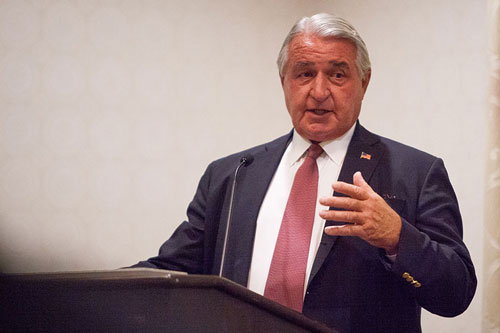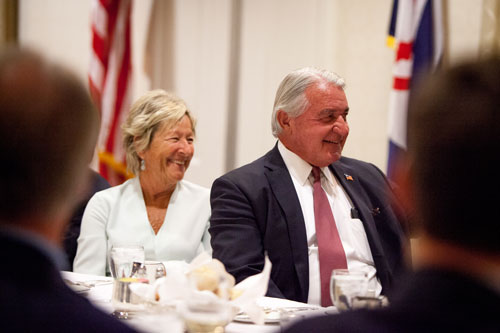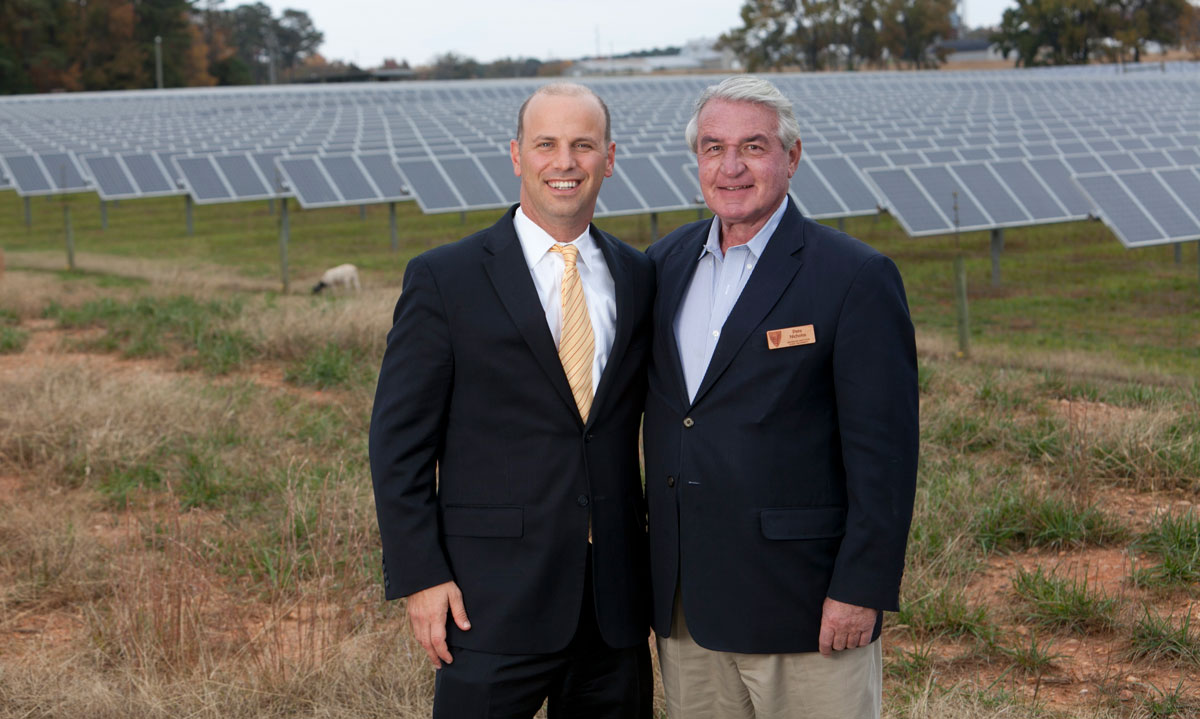The Boston Scientific co-founder and Duke alumnus created a lasting environmental legacy at the university
The Duke University community is mourning the loss of Peter M. Nicholas, the visionary and philanthropist who became synonymous with the university’s commitment to environmental education and solutions. Nicholas died May 14 at his home in Boca Grande, Fla. He was 80 years old.
“Pete understood Duke University’s potential to accelerate environmental progress, and he was relentlessly committed to realizing it,” said Brian Murray, interim director of the recently merged Nicholas Institute for Environmental Policy Solutions and Duke University Energy Initiative. “Thanks to Pete’s foresight, advice, and support, the Nicholas Institute has leveraged Duke’s expertise and convening power to achieve remarkable impacts at the local, national, and global levels. We will miss his guidance, even as we continue striving to fulfill his vision.”

Nicholas co-founded Boston Scientific Corporation in 1979 and served as its CEO for two decades. Under his leadership, it grew from a startup with 38 employees to the world’s largest medical device company dedicated to minimally invasive therapies.
A Duke alumnus with a degree in economics, Nicholas formed a lifelong bond with the university. His volunteer leadership spanned more than three decades, most notably as a member of the Board of Trustees from 1993 to 2005—serving as board chair during the final two years of that period. In 2021, Duke awarded him the University Medal, its highest honor for distinguished service.
He and his wife Ginny, a fellow member of the Class of 1964, generously supported the university’s research and educational initiatives over the years. Their philanthropy has shaped Duke’s approach to addressing environmental issues. Nowhere is that more evident than in the two organizations that bear the family’s name: the Nicholas School of the Environment and the Nicholas Institute for Environmental Policy Solutions.
A $20 million naming gift from Pete and Ginny Nicholas established the Nicholas School in 1995. At the time, it was the single largest gift from an individual or couple in Duke's history. As the school recounted in its remembrance, Pete Nicholas’ vision for the school was to expand Duke’s “reach and influence in undertaking critical research, training future leaders, and informing the debate about issues that range from global warming to the quality of our air and water.”
“With great foresight and imagination, Pete encouraged and supported Duke to be bold in our vision for environmental leadership,” said Toddi Steelman, Stanback Dean of the Nicholas School. “In his memory, we continue to honor that vision as we aspire to even greater climate and environmental impact at a time when the planet is most in need.”

Ten years later, Pete and Ginny provided the naming gift for the Nicholas Institute for Environmental Policy Solutions. The Nicholas Institute was established to help decision makers create timely, effective, and economically practical solutions to the world’s critical environmental and energy challenges. Since its founding, the institute’s experts have worked toward that mission by bridging Duke scholars and the policy world, delivering credible analyses and convening decision makers and relevant stakeholders to reach a shared understanding on issues.
“Pete was a multifaceted force of nature who influenced Duke and our work in innumerable ways,” said Tim Profeta, founding director of the Nicholas Institute. “The thing that I will miss most about Pete is the friendship and partnership in what we did at Duke together.”
Shortly after he was hired to lead the new institute, Profeta met with Pete Nicholas, then-Duke president Richard Brodhead, and former U.S. Environmental Protection Agency administrator William Reilly. During the discussion on the porch of the president’s house, Nicholas expressed a clear vision of how he wanted the university to put itself in service to society. As Profeta recalled, Nicholas saw Duke developing a “much more intimate relationship” with stakeholders involved in policy debates on environmental and energy issues than any university had before.
That initial conversation set the tone for Nicholas’ relationship with the institute over the years. Profeta said that he was always available to think through anything and to make connections utilizing his extensive knowledge of Duke and the public and private sectors.
“He knew how to lead; he knew how to express his vision,” Profeta said. “When you sat and talked to him, he would be crystal clear on the way he saw things. But he also had the humility to appreciate other perspectives and know that he didn't have all the knowledge. It was a really synthetic process to work on issues with him.”

Reilly, the former EPA administrator, has long served as the chair of the institute’s board of advisors. He credited Nicholas with recognizing the value of a board that brought together major environmental NGOs, researchers, and private sector leaders to help ensure “a unifying, practical message to the university.”
“Pete was a visionary with drive and passion, and the legacy he left realized his aspirations, as he frequently told me,” Reilly said. “His very positive outlook for the future of the environment, together with Tim’s, suffused the institute with a much-needed conviction that we could meet environmental and climate challenges.”
Reilly echoed Profeta’s thoughts on what it was like to work with Nicholas. “His ebullient, sunny personality made the work fun when he was around,” Reilly recalled. “He wore his immense contribution lightly, deferred readily when he thought someone had a good idea, and he saw and helped others to see the promise of success. His energy, generosity and confidence inspired us all, for his assurance and light touch constituted a rare kind of leadership that it was a pleasure to follow.”
Duke is preparing to launch a broader effort to accelerate sustainable and equitable solutions to the climate crisis while developing the next generation of climate leaders. A university-wide climate initiative will build on Duke experts’ track record of substantial contributions to understanding and addressing climate change and its impacts. Pete Nicholas’ influence will be deeply felt as the initiative develops.
“He will forever have an indelible imprint on Duke and Duke’s leadership on energy and the environment,” Profeta said. “What this university has built over the past three decades, taking a global leadership role on these challenges, has been because of the generosity and vision of Pete and Ginny Nicholas. There is so much more work to be done, but they have given the university a platform to be a generator of solutions to these problems. That will be a legacy that lasts for years and years.”
